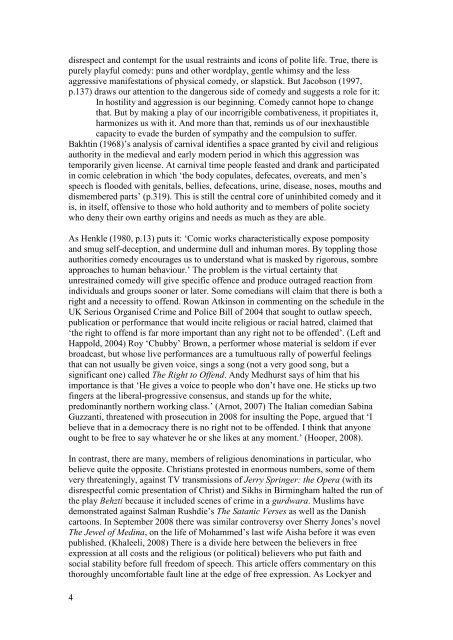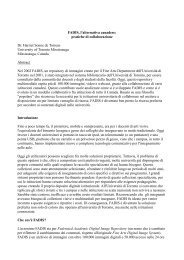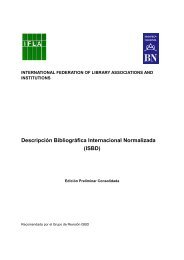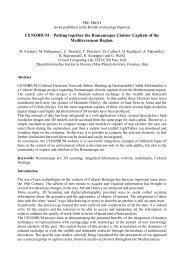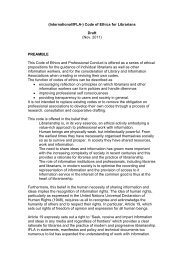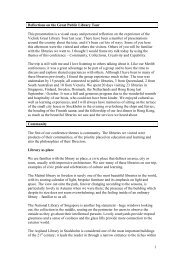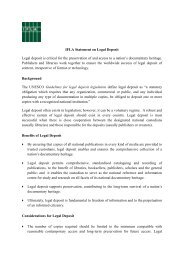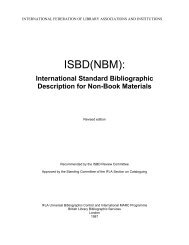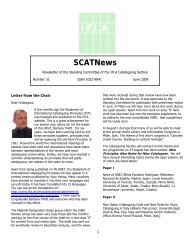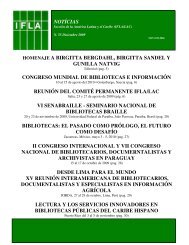COMEDY AS FREEDOM OF EXPRESSION - IFLA
COMEDY AS FREEDOM OF EXPRESSION - IFLA
COMEDY AS FREEDOM OF EXPRESSION - IFLA
You also want an ePaper? Increase the reach of your titles
YUMPU automatically turns print PDFs into web optimized ePapers that Google loves.
disrespect and contempt for the usual restraints and icons of polite life. True, there is<br />
purely playful comedy: puns and other wordplay, gentle whimsy and the less<br />
aggressive manifestations of physical comedy, or slapstick. But Jacobson (1997,<br />
p.137) draws our attention to the dangerous side of comedy and suggests a role for it:<br />
In hostility and aggression is our beginning. Comedy cannot hope to change<br />
that. But by making a play of our incorrigible combativeness, it propitiates it,<br />
harmonizes us with it. And more than that, reminds us of our inexhaustible<br />
capacity to evade the burden of sympathy and the compulsion to suffer.<br />
Bakhtin (1968)’s analysis of carnival identifies a space granted by civil and religious<br />
authority in the medieval and early modern period in which this aggression was<br />
temporarily given license. At carnival time people feasted and drank and participated<br />
in comic celebration in which ‘the body copulates, defecates, overeats, and men’s<br />
speech is flooded with genitals, bellies, defecations, urine, disease, noses, mouths and<br />
dismembered parts’ (p.319). This is still the central core of uninhibited comedy and it<br />
is, in itself, offensive to those who hold authority and to members of polite society<br />
who deny their own earthy origins and needs as much as they are able.<br />
As Henkle (1980, p.13) puts it: ‘Comic works characteristically expose pomposity<br />
and smug self-deception, and undermine dull and inhuman mores. By toppling those<br />
authorities comedy encourages us to understand what is masked by rigorous, sombre<br />
approaches to human behaviour.’ The problem is the virtual certainty that<br />
unrestrained comedy will give specific offence and produce outraged reaction from<br />
individuals and groups sooner or later. Some comedians will claim that there is both a<br />
right and a necessity to offend. Rowan Atkinson in commenting on the schedule in the<br />
UK Serious Organised Crime and Police Bill of 2004 that sought to outlaw speech,<br />
publication or performance that would incite religious or racial hatred, claimed that<br />
‘the right to offend is far more important than any right not to be offended’. (Left and<br />
Happold, 2004) Roy ‘Chubby’ Brown, a performer whose material is seldom if ever<br />
broadcast, but whose live performances are a tumultuous rally of powerful feelings<br />
that can not usually be given voice, sings a song (not a very good song, but a<br />
significant one) called The Right to Offend. Andy Medhurst says of him that his<br />
importance is that ‘He gives a voice to people who don’t have one. He sticks up two<br />
fingers at the liberal-progressive consensus, and stands up for the white,<br />
predominantly northern working class.’ (Arnot, 2007) The Italian comedian Sabina<br />
Guzzanti, threatened with prosecution in 2008 for insulting the Pope, argued that ‘I<br />
believe that in a democracy there is no right not to be offended. I think that anyone<br />
ought to be free to say whatever he or she likes at any moment.’ (Hooper, 2008).<br />
In contrast, there are many, members of religious denominations in particular, who<br />
believe quite the opposite. Christians protested in enormous numbers, some of them<br />
very threateningly, against TV transmissions of Jerry Springer: the Opera (with its<br />
disrespectful comic presentation of Christ) and Sikhs in Birmingham halted the run of<br />
the play Behzti because it included scenes of crime in a gurdwara. Muslims have<br />
demonstrated against Salman Rushdie’s The Satanic Verses as well as the Danish<br />
cartoons. In September 2008 there was similar controversy over Sherry Jones’s novel<br />
The Jewel of Medina, on the life of Mohammed’s last wife Aisha before it was even<br />
published. (Khaleeli, 2008) There is a divide here between the believers in free<br />
expression at all costs and the religious (or political) believers who put faith and<br />
social stability before full freedom of speech. This article offers commentary on this<br />
thoroughly uncomfortable fault line at the edge of free expression. As Lockyer and<br />
4


